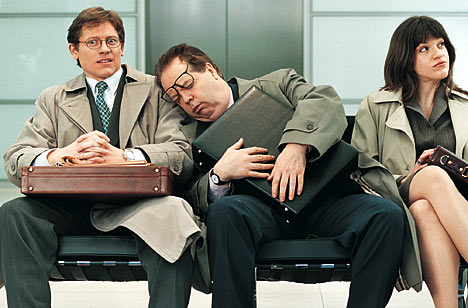Edward Thorndike:
1. Explain Thorndike's puzzle-box experiment.Put cat in a puzzle box – observe the cat’s behavior toward escaping to get the food.
2. Explain Thorndike's "Law of Effect".
1. Explain Thorndike's puzzle-box experiment.Put cat in a puzzle box – observe the cat’s behavior toward escaping to get the food.
2. Explain Thorndike's "Law of Effect".
Law of Effect: Actions bring a consequence and that determines future behavior3. Explain Thorndike's "Law of Exercise".For the law of Exercise he stated that if a behavior is used it will continue and it will be reinforced, but if it is not used, their improvement or reinforcement will disappear.
B.F. Skinner:
1. Explain Skinner's concept of Operant ConditioningOperant Conditioning: reinforcement and punishment change our behavioral tendencies
B.F. Skinner:
1. Explain Skinner's concept of Operant ConditioningOperant Conditioning: reinforcement and punishment change our behavioral tendencies
2. What does reinforcement always do?Reinforcement: behavior increase
3. What does a punishment always do?Punishment: behavior to decrease
4. Explain the difference between "positive" and "negative" as they are used in operant conditioning.
Pos (+): something is given
Neg (-): Something is taken away
 This study was made by Science and its studiers of limits and how to improve society when is talking about sleep for the teen traffic accidents. They made a study that by having a late start to school Teens were more awake and alert and for their instints they coukd work imedietly without suffering a traffic accident some of the result this experiment or study acomplish or put an end to a doubt was: "As a result, adolescents get an inadequate amount of sleep due to early school start times, which increases their daytime sleepiness and may in turn increase their odds of crashing their vehicles while driving." I for my personal response and opinion think that a late start would be better because from all statistic percentage and from their rates of what can could happen leads that teens that are drivers but obtain the 9 hours sleep will have a less probability of crashing.
This study was made by Science and its studiers of limits and how to improve society when is talking about sleep for the teen traffic accidents. They made a study that by having a late start to school Teens were more awake and alert and for their instints they coukd work imedietly without suffering a traffic accident some of the result this experiment or study acomplish or put an end to a doubt was: "As a result, adolescents get an inadequate amount of sleep due to early school start times, which increases their daytime sleepiness and may in turn increase their odds of crashing their vehicles while driving." I for my personal response and opinion think that a late start would be better because from all statistic percentage and from their rates of what can could happen leads that teens that are drivers but obtain the 9 hours sleep will have a less probability of crashing.  In October 26, 2010, print issue of Neurology® an information publish to clarify why the lack of sleep addect us, the medical journal of the American Academy of Neurology were the main persons involved in this study.
In October 26, 2010, print issue of Neurology® an information publish to clarify why the lack of sleep addect us, the medical journal of the American Academy of Neurology were the main persons involved in this study.  Zaw W. Htwe, MD who worked at a hospital of sleep disorder he wanted teenager or student to have a longer bedtime sleep. The people in charge of this study is the Associated Professional Sleep Societies (APSS). This study or experiment was made in order to see how student improve in school time by increasing the amount of bedtime 40 minutes this camed to a conclusion that a student needs at least 8 to 9 hours of bedtime. This study maked the students have a great majority of time in bed instead of keeping awake longer by doing work. One very important results was that the, "Following a 40-minute delay in start time, the students utilized 83 percent of the extra time for sleep. This increase in sleep time came as a result of being able to 'sleep in' to 6:53 a.m., with little delay in their reported school night bedtime. I bealive this was a good article or study because it directly clear our minds how student will imporve their knowledge at school by having a great amount of time a sleep as said 9 hours of sleep.
Zaw W. Htwe, MD who worked at a hospital of sleep disorder he wanted teenager or student to have a longer bedtime sleep. The people in charge of this study is the Associated Professional Sleep Societies (APSS). This study or experiment was made in order to see how student improve in school time by increasing the amount of bedtime 40 minutes this camed to a conclusion that a student needs at least 8 to 9 hours of bedtime. This study maked the students have a great majority of time in bed instead of keeping awake longer by doing work. One very important results was that the, "Following a 40-minute delay in start time, the students utilized 83 percent of the extra time for sleep. This increase in sleep time came as a result of being able to 'sleep in' to 6:53 a.m., with little delay in their reported school night bedtime. I bealive this was a good article or study because it directly clear our minds how student will imporve their knowledge at school by having a great amount of time a sleep as said 9 hours of sleep. 